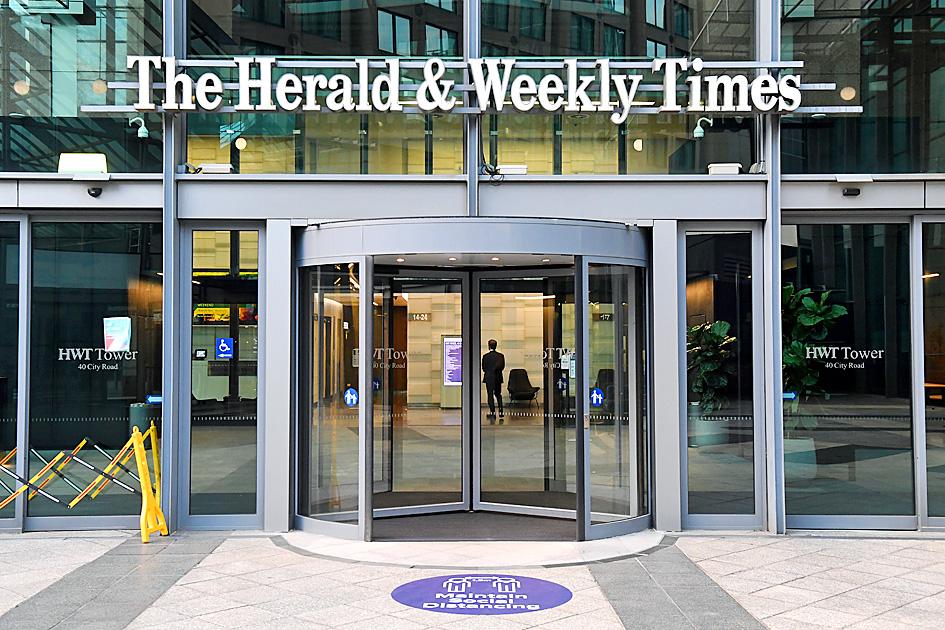Australia’s largest newspaper publisher, News Corp, yesterday announced that most of its suburban and regional mastheads nationwide would next month become digital-only due to the COVID-19 pandemic and digital platforms sharing their content.
News Corp Australasia executive chairman Michael Miller described the shift that is to take effect on June 29 as significant and said that jobs would be lost, but did not say how many.
“COVID-19 has impacted the sustainability of community and regional publishing. Despite the audiences of News Corp’s digital mastheads growing more than 60 percent as Australians turned to trusted media sources during the peak of the recent COVID-19 lockdowns, print advertising spending, which contributes the majority of our revenues, has accelerated its decline,” Miller said in a statement.

Photo: EPA-EFE
Many News Corp print mastheads were challenged, and the double effects of the coronavirus lockdown plus tech platforms such as Google and Facebook Inc not remunerating local publishers for content made the mastheads unsustainable, Miller said.
“These initiatives are significant. They will involve fundamental changes to how we operate our business, but they are necessary,” Miller said.
Some mastheads, or newspaper titles, would disappear, but their news would be published in regional sections of other mastheads, he said.
Paul Murphy, chief executive of Australia’s journalists union, the Media, Entertainment and Arts Alliance, said he understood that 150 editorial jobs would be lost.
“We’ve already seen over 100 titles around the country close in regional areas and in local news coverage,” Murphy said.
“It really underlines the scale of the crisis confronting regional and local journalism in this country, which has been brought to a head by this pandemic,” he added.
News Corp early last month suspended printing operations for 60 local papers in Australia as advertising revenue vanished due to the pandemic.
The government has announced that Google and Facebook would be forced to pay for news content in Australia.
The Australian Competition and Consumer Commission is in July to release draft rules for the platforms to pay fair compensation for content siphoned from news media.
News Corp publishes the best-selling newspapers in most of Australia’s largest cities.

Taiwan Transport and Storage Corp (TTS, 台灣通運倉儲) yesterday unveiled its first electric tractor unit — manufactured by Volvo Trucks — in a ceremony in Taipei, and said the unit would soon be used to transport cement produced by Taiwan Cement Corp (TCC, 台灣水泥). Both TTS and TCC belong to TCC International Holdings Ltd (台泥國際集團). With the electric tractor unit, the Taipei-based cement firm would become the first in Taiwan to use electric vehicles to transport construction materials. TTS chairman Koo Kung-yi (辜公怡), Volvo Trucks vice president of sales and marketing Johan Selven, TCC president Roman Cheng (程耀輝) and Taikoo Motors Group

Among the rows of vibrators, rubber torsos and leather harnesses at a Chinese sex toys exhibition in Shanghai this weekend, the beginnings of an artificial intelligence (AI)-driven shift in the industry quietly pulsed. China manufactures about 70 percent of the world’s sex toys, most of it the “hardware” on display at the fair — whether that be technicolor tentacled dildos or hyper-realistic personalized silicone dolls. Yet smart toys have been rising in popularity for some time. Many major European and US brands already offer tech-enhanced products that can enable long-distance love, monitor well-being and even bring people one step closer to

New apartments in Taiwan’s major cities are getting smaller, while old apartments are increasingly occupied by older people, many of whom live alone, government data showed. The phenomenon has to do with sharpening unaffordable property prices and an aging population, property brokers said. Apartments with one bedroom that are two years old or older have gained a noticeable presence in the nation’s six special municipalities as well as Hsinchu county and city in the past five years, Evertrust Rehouse Co (永慶房產集團) found, citing data from the government’s real-price transaction platform. In Taipei, apartments with one bedroom accounted for 19 percent of deals last

RECORD-BREAKING: TSMC’s net profit last quarter beat market expectations by expanding 8.9% and it was the best first-quarter profit in the chipmaker’s history Taiwan Semiconductor Manufacturing Co (TSMC, 台積電), which counts Nvidia Corp as a key customer, yesterday said that artificial intelligence (AI) server chip revenue is set to more than double this year from last year amid rising demand. The chipmaker expects the growth momentum to continue in the next five years with an annual compound growth rate of 50 percent, TSMC chief executive officer C.C. Wei (魏哲家) told investors yesterday. By 2028, AI chips’ contribution to revenue would climb to about 20 percent from a percentage in the low teens, Wei said. “Almost all the AI innovators are working with TSMC to address the